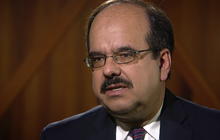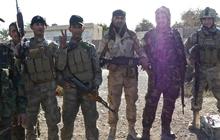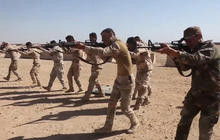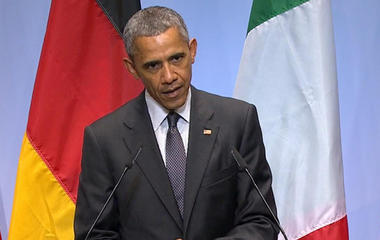cbsnews.com
WASHINGTON --Ambassador Alberto Fernandez is now free to speak his mind after retiring last month following a long career at the State Department. He left amid sharp differences over how to defeat the Islamic State of Iraq, which is also known as ISIS.
"It's not that ISIS is so great. It is that the response against ISIS is both limited, and weak," Fernandez told CBS News in his first interview since he left the Obama Administration. "We should have a strategy, what are we waiting for?"
Until recently Fernandez ran the Center for Strategic Counterterrorism Communications (CSCC), which the Obama Administration created in 2010 to counter terror groups online.
Alberto Fernandez
CBS NEWS
"There is a fantasy which exists in Washington, which is this," Ambassador Fernandez argues. "Somehow if you put magic social media or public diplomacy pixie dust on a problem, it will go away."
His staff of fifty workers struggled to compete against ISIS' virtual online army which posts videos and messages from as many as 90,000 twitter accounts around the world. Despite being outnumbered, Fernandez thinks that the social media space is too valuable to abandon.
Social media has been a particularly effective tool for ISIS, which has recruited more than 20,000 foreign fighters to Iraq and Syria. ISIS presents itself as a defender of Sunni Muslims against the brutality of the Assad regime in Syria and the Shiite-dominated government in Iraq. In short, ISIS can portray itself as one of the only "good guys."
Fernandez thinks that to stop ISIS requires understanding that its followers often believe that they are serving a "noble" cause which is what inspires both their loyalty and self-sacrifice.
"ISIS is psychopathic but that doesn't mean that the people that are attracted to it are for sick perverse reasons," he said. "It's about religion, but it's also about you, about your self-fulfillment, about doing something, a cause that is bigger than yourself. You know if we just think it's about these wackos going around lopping off heads, maybe we'll make ourselves feel better, but we actually don't address the problem."
A much-needed tool for the U.S. and its European counterparts would be a central repository of content and material that mimics ISIS' vast archive of pictures, footage and personal testimonials from people who joined the fight.
"Finding the person who left the Islamic State, who abandoned the cause, who felt he was betrayed -- those people exist but they're just a lot less of them," he said. "You need to be talking to the mother of the guy who was killed by ISIS for no reason."
The State Department is now in the early stages of creating that kind of infrastructure. It created a new messaging team focused solely on countering ISIS but in a less overt way than when Fernandez ran the program.
Former White House adviser Rashad Hussain replaced Fernandez, and told CBS News that he wants this new strategy to "properly amplify" facts and stories, particularly those gathered from former radicals. The aim, he said, is to "expose the reality of what terrorists are doing, including the damage they are inflicting on the Muslim communities they claim to defend."
A Senior State Department official told CBS News that the 60-65 people who work for the CSCC are now focused on coordinating and distributing messaging across U.S. government agencies and foreign partners, including international organizations who work in the Muslim world. Now only a third of the work is in the social media space.
The official, who spoke on condition of anonymity as required under State Department guidelines, said that that each day information goes out to a private listserv of around 3,000 recipients who then choose how and what to publicly disseminate. Maps of land liberated from ISIS control, and intelligence gathered during raids are the types of nuggets often shared, according to this official.
Not all of the information has a U.S. label on it, which makes identifying it as propaganda more difficult. That decision was made, the official said, because the message is more effective if the Administration avoids a 'one on one' war of words between the US and ISIS-fan boys. There are also plans to set up a messaging center with the government of the United Arab Emirates and information distribution with other 'credible partners.'
The State Department declined to disclose how much more funding it is requesting to execute the new strategy, but said it has made a request to expand the budget from the previous allocation of $5.5 million dollars.
Time will tell if the new approach is more effective. It does appear to carry less political risk when the war of ideas is carried out under the radar.
Fernandez learned that even if his often aggressive and snarky messaging got under the skin of extremists, that strategy could backfire among a domestic audience. A controversial mock video he created called "Run Don't Walk to ISIS land" drew ire within the Administration, and was skewered in a segment on a segment of the HBO show "This Week Tonight with John Oliver."
"My sense was that sometimes people in government were more nervous about what John Oliver might say, than what ISIS might say," he said. "You're afraid of being mocked."
Fernandez argues that the Administration was simply too risk averse. But he admits that silencing ISIS' momentum on social media also requires slowing ISIS' on the ground.
The ongoing slaughter in Syria is one of ISIS' most powerful recruiting tools, and the State Department acknowledges that is a big draw for foreign fighters. Fernandez says you need only look at the Arabic-language press in the region to understand that many blame the Obama Administration for failing to stop the slaughter of civilians in Syria by the Assad regime. ISIS capitalizes on those grievances.
"If people are being radicalized in part because of carnage in Syria, because of imagery of children being killed, because of imagery of impunity, of barrel bombs, of chemical weapons, then you need to say, well, maybe changing the reality in Syria, or improving the reality of the suffering of the Syrian people, is one way of cutting out the narrative from underneath the legs of ISIS."
Yet changing that perception would require changing Middle East policy. After all, Fernandez says, the best propaganda is reality.




No comments:
Post a Comment